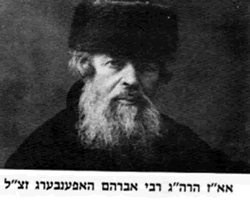
The Hofenberg Family
I, Hofenberg Shraga was born
in Israel in March 11, 1927 and grew- up and experienced what the generation
of native born Sabras in 1920s experienced. Incidentally, I served in the IDF
in Eilat (Um Rash Rash) in 1950. Eilat was Streets free, Hotels free, traffic
lights free, traffic at all free. Nothing! - Desert only. *
With all due respect,
Hofenberg Shraga.,
The Story of the Hofenberg Family from a phone call to Shraga on 8-26- 2003;
My Father; Yerakhmiel Hofenberg was born in Vashki in 1894. He was the son of
Ita and Rabbi Avraham Hofenberger, who was born in the Hebrew year of 5613 (1853).
Rabbi Avraham Hofenberger attended the Mir Yeshiva for his primary studies.
After graduating he moved to Kovno to learn from Rabbi Eliezer Gardan.
The final studies he accomplished at the great and famous academy in Volozhin
Eyts-Hayim Yeshiva. R' Aleksander Moyshe Shapiro ordained him as Rabbi in the
Year of 5632 (1872). After six years in the Volozhin Yeshiva he received a teaching
diploma from the genial Volozhin Yeshiva heads, the prodigious Hanaziv, from
Reb Refoel Shapiro the later Yeshiva head and from Reb Hayim Soloveytshik.
He was elected as the Vashki Rabbi in 5647 (1887). Here he served as the town
Rabbi for 43 years. The small village Konstanove was named by the vicinity Jews
as Vashki and under this name it remains. The shtetl was situated in the Birz
district, some 40m Km. north to Ponivezh. Washki was a small village. Prior
to the First World War Vashki was populated by 50 Jewish families. The linen
trade and its export to England were their main occupation. There were also
other typically Jewish employment and professions.
Ita and Rabbi Avraham Hofenberger children;
1. Son ; Azriel Hofenberg was a writer of Yiddish plays. He moved to the states
and lived with his sister; Sozka and her husband; Rabbi Eliezer Levin. He was
never married. He wanted to make Aliah to Israel, but his brother Yerakhmiel,
who lived in Israel suggested that he would have difficulties having his plays
performed in Israel since David Ben Gurion (as many other leaders of the Yishuv)
discouraged any attempts to institute the Yiddish culture
in Eretz Israel.
2. Shmuel Hofenberg. Not much is known about him; he was never married and at
one point immigrated to the states. He was a simple guy not typical to his illustrious
Rabbinical family. He did not like life in the U.S. and returned to Lithuania
were he later died.
3. Daughter; Rashka (Pinchasovitz) survived the holocaust in a camp (Shtatoff).
The son in law of her brother Pinchas was able to find her in Germany after
the war. She immigrated to Israel.
4. Daughter; Rivka was married to Naphtali Magid and lived in Crimea. She survived
the war (escaped to Soviet Asia) and some of her family immigrated to Israel
.
5. Daughter Sozka and husband; Rabbi Eliezer Levin had 104 Children, grandchildren
and great grandchildren. Most of the family is very religius and live in the
states (established Talaz Yeshiva in Chicago and Yatid Neeman in Toronto)
6. son; Pinchas Hofenberg was a Hebrew teacher in Lithuania. He died of natural
causes in ghetto Vilna during the war. His daughter lived in a kibbutz in Israel
(Daphna?). The family found out about him from a female soldier in the IDF that
served with Hofenberg Shraga and was a holocaust survivor and was prior to the
war his student in the Tarbut school
7. Yerakhmiel Hofenberg (born in Vashki in 1894 died in Tel Aviv in 1975). Yerakhmiel
Hofenberg left Lithuania for South Africa at age 17 c 1911. He lived there for
about four years working in a market in Johannesburg. He returned to Lithuania
just as World war 1 started. Per Shragaâ€_ His story is not necessarily
a rabbinical one, but as a local workers' leader during the First World War
in Novogrodok. He unified and organized forced workers, under the German rule,
in the circumstances of then and at the German rule of then, naturally.
He established a dramatic band, which presented "The Kreutzer Sonata"
on the stage.
At the premiere he was offered N. Bialik's poetry volume with a dedication in
Hebrew.
Why was he in Novogrodok far from Vashki and Lithuania?
“â€_.During the First World War the Russians exiled
all the Jews of Vashki deep into Russia. Only few returned to the shtetl after
war. This was the fate of most of small villages in west Lithuania. The Jews
resettled themselves in bigger towns and did not return to their natal congregations.
Cut of from their Yiddish home and their tradition they became secularâ€_.â€
We know that in 1919 he was in Novogrodok in in the early 1920s he returned
to Lithuania (after more then a hundred years it became independent of Russia
and experienced a “renaissance†period that for
the first years included also the Jews as “equal citizensâ€)
were he was a member of Zeirei Zion (Socialist Zionist movement) in 1924 he
made Aliah to Israel with his wife. They had two children; Shoshana (Kalo) was
born in 1924 and Shraga in 1927.
Shoshana Z’’L studied with my fathers’
sister (Shoshana “Zoozi†nee Gordin Gefen Z’’L).
They became best friends also with Tmima Livni Z’’L
and Aliza Efron.
Back to Rabbi Hofenberg and Vashkiâ€_.
Prior to the Second World War 80 Jewish families lived in Vashki.
Rabbi Hofenberg published his Book "Voice in the Heights" in 5658
(1898). The Rabbi passed away at the month of Nissan, 5689 (1929).
His son in law; Rabbi Eliezer Levin (married to his daughter; Sozka) replaced
him as the Vashki town Rabbi. He resettled to the States (1936? later Rabbi
of Detroit and Cleveland) and was replaced by Rabbi Tsvi Yankilov.
Rabbi Tsvi Yankilov and his congregation were annihilated by the Nazis. .